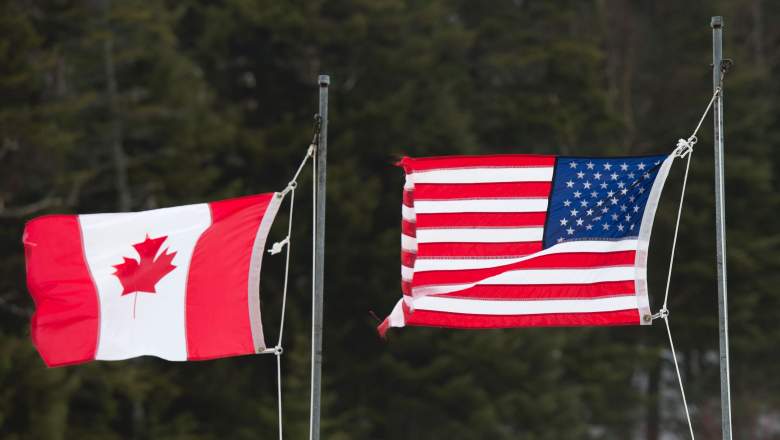
Getty Canadian and American flags are seen at the US/Canada border March 1, 2017, in Pittsburg, New Hampshire. / AFP PHOTO / Don EMMERT (Photo credit should read DON EMMERT/AFP via Getty Images)
On March 18, President Donald Trump and Canadian Prime Minister Justin Trudeau announced the restriction of all non-essential travel across the Canada-U.S. border. Trump announced the news on Twitter. He said, “We will be, by mutual consent, temporarily closing our Northern Border with Canada to non-essential traffic. Trade will not be affected. Details to follow!”
On the other side of the border, during a press conference on Wednesday morning, Prime Minister Justin Trudeau echoed the President’s sentiment.
“Over the past few days, I have spoken to President Trump about what we can do to slow the spread of COVID-19,” Trudeau said. “We have agreed that both Canada and the United States will temporarily restrict all non-essential travel across the Canada-U.S border.”
“Travelers will no longer be permitted to cross the border for recreation and tourism.” These restrictions have been laid out by both governments to help curb the spread of the COVID-19 coronavirus.
Essential travel will continue, however. Trudeau said, “Our governments recognize that it is critical that we preserve supply chains between both countries. These supply chains ensure that food, fuel and live-saving medicines reach people on both sides of the border.” Supply chains like trucking will not be affected by the border restrictions.
What Is Essential Travel & Non-Essential Travel?
With the new border restrictions announced, the governments have made it clear that essential travel will be not affected. Essential travel across the border is traffic that is paramount to individuals or both countries.
Important supply chains like truck drivers hauling medicine or food over the border is considered essential travel. For an individual person crossing the border, essential business or personal reasons will suffice.
Trudeau said during the presser, “Canadians and Americans cross the border every day to do essential work or for other urgent reasons. That will not be impacted.”
Non-essential travel is subjective, however traveling for tourism or recreation is not allowed.
The government of Canada defined non-essential travel on their website. It states, “It is up to you to decide what ‘non-essential travel’ means, based on family or business requirements, knowledge of or familiarity with a country, territory or region, and other factors.”
Heavy has reached out to both the U.S. Customs and Border Protection and Canada Border Services Agency for further clarification on what is expected of travelers at the border.
READ NEXT: Rudy Gobert Apologizes for ‘Endangering’ Others After Coronavirus Test